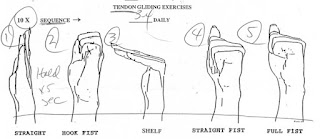My husband is an internationally
recognized scholar in his field and a research maven, so naturally he
was drawn to the project of tracing my family history with a
grandmother who had married and divorced thirteen times to ten
different men. Most experts like a challenge, and my convoluted
family history seemed a challenge he would take on and defeat easily
with his ninja research skills. This weekend at lunch, he moaned to
me about the latest bizarre twist he'd uncovered. “The more
information I collect, the more confusing it gets, and the less I
know,” he complained.
We laughed at the strange tale he's
just uncovered about my great-grandparents and the way that means he
once again has much more work to do and it will be more difficult. He
said, “No one would believe any novel you wrote with all the
unbelievable but true stories about your family. They'd say it's too
contrived and incredible.”
This left me picturing a group of drunk
screenwriters sitting around, desperate to pitch a story that will
excite the studio execs and get funding and become a huge hit.
Amy says, “We'll begin with a guy who
marries a woman while he's using an assumed name—and he doesn't
tell her about it for years, but when he does, she has kids and goes
on with him under his real name.”
Dave adds, “But they keep divorcing
each other, marrying different people, then divorcing those people,
and remarrying each other again and again.”
“Yeah, I like it,” says Martin.
“They're each the great love of the other's life, but they just
can't seem to make it work. That's give us lots of dramatic
conflict.”
“And then,” Amy continues, on a
real roll now, “their oldest daughter, who's grown up with all this
passionate craziness, gets married young and leaves husband and baby
a year later to marry another guy, whom she leaves in less than two
years with another baby, to go marry a guy with the Texas Rangers,
who gets killed in a gunfight, causing her to lose another baby, and
then she goes on a real tear, marrying and divorcing guys all over
the place.”
Martin laughs as he's taking a swig of
vodka and spits it all over. “And one of them is an immigrant from
Czechoslovakia who loves her so much that he keeps hanging around
even after she dumps him and remarries her whenever she's in some
kind of trouble, but keeps hanging around even after she jilts him
again and again.”
Dave nods with a grin. “Loyal Dobbin.
Every story needs a loyal Dobbin.”
“We've got to make it weirder,”
says Amy. “More complications. Maybe the Texas Ranger isn't really
dead and starts trying to find her, but she's marrying all these guys
and taking their names. Oh. And she starts out as Bessie, but she
decides Agnes is a name with more class—she's trying to marry her
way up the social ladder, a real Becky Sharp right out of Thackeray
on the American frontier.”
“Nah! Make it Indian Territory before
it became Oklahoma and make her an Indian and some of these guys she
marries early on Indians, too, but then she's going for richer white
guys.” Dave grins again. “And of course, we've got Martin's crazy
Czech hanging around, poor at first but he could be making himself
richer and richer for the sake of her.”
“I like it!” Martin says. “And
she also masquerades as someone named Dolly, too, when she wants to
get out of a tight situation. Then, as she gets older and more
settled, we've got those abandoned kids to come looking for her and
make her life difficult in revenge.”
“I've got it!” shouts Dave, jumping
around and half-falling over in drunken excitement. “She was the
oldest of a big family and born while that father was still using a
false name. Her birth name isn't even what she thinks it is. Maybe
her dad was a crook or a wanted man of some kind. Maybe someone finds
out and blackmails her.”
“Yes!” screams Amy. “When she's
older and thinks it's all behind her, her son can come back and rape
her baby sister she's always been closest to, and on her deathbed,
her daughter will find her and accuse her of ruining her life and
tell her she's glad she's dying.”
Martin shakes his head. “Dammit! I
hate that Bette Davis is dead. Would she make a great Bessie/Agnes or
what? It would be Oscars all the way. I can see it now.”
The three are now so drunk and stoned
on the weed they've been smoking along the way that they just lay
back in a beatific stupor, sure that they've come up with the
greatest movie concept ever and their fortunes are surely made.
I am married to a man of fortitude,
however, and he has only begun to fight. He's currently trying to
track down the marriage certificate for that initial marriage between
my great-grandparents under the false name—and who knows what new
dramatic material he will uncover when he does?


